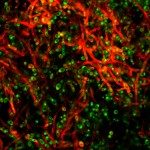Lien vers Pubmed [PMID] – 19541532
Curr. Opin. Microbiol. 2009 Aug;12(4):358-64
Opportunistic fungal pathogens are responsible for life-threatening systemic infections in immunocompromized individuals. Yet, they are also able to persist in immunocompetent individuals through different strategies. This review explores recent advances in our understanding of several survival strategies: the establishment of a commensal relationship between yeast of the genus Candida and the host; the formation of biofilms that allow microbes in these communities to be protected from chemical and cellular attacks; and the persistence of airborne pathogens within macrophages following primary infection. While research has concentrated on deciphering virulence factors of pathogenic fungi, additional understanding of how fungal pathogens persist in healthy hosts might help us design new strategies to prevent the transition from harmless interactions to devastating infections.


